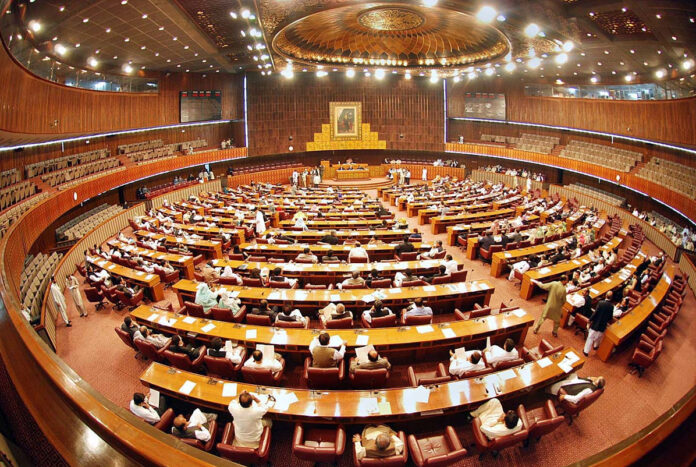–Senators call for raise in salary, pensions, more allocations for health, education sectors
–Reject 11pc proposed cut in share of provinces in NFC Award
ISLAMABAD: The Upper House of parliament on Wednesday unanimously adopted recommendations of the Senate Standing Committee on Finance Bill 2020, which constituted 40 amendments and 53 general consensus recommendations to the lower house.
The Senate resumed its session on Wednesday with Chairman Sadiq Sanjrani in the chair.
The House unanimously adopted recommendations of the Senate’s Standing Committee on Finance on the Finance Bill 2020, containing the annual budget statement. The motion was moved by Senator Farooq Hamid Naek.
Earlier, the House unanimously passed a resolution demanding the government ensure writing of Khatim-un-Nabbiyeen with the name of Holy Prophet (Peace Be Upon Him) in the educational syllabus and official documents.
The resolution was moved by Senator Muhstaq Ahmed.
The House recommended that salaries of government employees be enhanced by at least 10 per cent. The Senate recommended that the federal government should double the budget for education and health sector. It demanded that budget allocation for the Ministry of National Health Services must be enhanced to a minimum of 5 per cent.
The Senate recommended granting of tax relief for the manufacturing and supply of Personal Protective Equipment (PPE). Budgetary allocations for online education and Higher Education Commission (HEC) were also recommended by the House.
It demanded that an 11 per cent cut proposed on the share of provinces in the National Finance Commission (NFC) Award must be revised immediately. It was also recommended that more funds should be allocated for management of rainwater reservoirs as well as the construction of small dams.
The recommendations say that tobacco must be treated as a crop like wheat, maize, and sugarcane and must be exempted from taxes and duties. However, Federal Excise Duty (FED) on cigarettes should be enhanced as per
the World Health Organisation’s (WHO) guidelines.
The House recommended that custom duties of raw material, essential finished goods and plant and machinery whose domestic alternative is available in the country should be reduced to zero. Furthermore, Customs duties of these items, having local alternatives, available, must be charged at double of the existing rates. Abolishment of all kinds of withholding tax, chargeable on cash transaction forms banks has also been recommended by the upper house.
The House recommended that the recycling industry functioning at small levels should be exempted from sales tax. It recommended that funds should be allocated for improvement in the aviation sector and to upgrade airports across the country.
The Senate recommended that a realistic tax collection target should be set for the next fiscal year. It recommended raising at least 50 per cent in the Corona Stimulus Package for fertilizer subsidy, loan remission and other relief to the farmers in view of Covid-19 and locust challenges.
The House demanded to restore zero-rated facility or slash general sales tax from 17 per cent to 4 per cent for the textile export sector.
Minister for Industries and Production Hammad Azhar said that the government has tried to minimize the impact of Covid-19 on the economy by pursuing a prudent strategy.
Winding up discussion on the Finance Bill, 2020-21 in the Senate, he said that presenting a tax-free budget while enhancing allocations for development, as well as education and health, in the face of coronavirus shows the leadership of Prime Minister Imran Khan.
The minister said that all the economic indicators were showing positive trends prior to the break out of the pandemic. “We reduced the current account deficit by 73 per cent, trade deficit 31 per cent and fiscal deficit to 3.8 per cent in the first nine months of the current fiscal year,” he said.
He said that it is also for the first time that our primary surplus remained positive. During this period, FBR collections were also witnessing 17 per cent growth and non-tax revenue saw an increase of 134 per cent. He said that Foreign Direct Investment (FDI) also doubled from $1 billion to $2 billion and refunds of Rs250 billion were also made to the businesses.
Sharing the main points of the next budget, the minister said that no new tax has been imposed rather several taxes have been abolished. He said the custom duties on 1600 tariff lines of different raw materials have been abolished.
Over ten withholding taxes have also been waived off. He said that Rs661 billion have been set aside for the annual Public Sector Development Programme (PSDP). He also said that Balochistan has been given the biggest share in the PSDP followed by Sindh.
The minister categorically stated that the federal government has not withheld the amounts of the provinces under the NFC.
The minister assured that the recommendations of the upper house for the Finance Bill, 2020-21, will be given due consideration.
Hammad Azhar said Pakistan’s ranking on the ease of doing business improved due to prudent policies of the government. He said that Pakistan complied with the majority of action plans of the Financial Action Task Force (FATF). He said that 14 out of 27 points of FATF have so far been met.
The House was later prorogued.





“Earlier, the House unanimously passed a resolution demanding the government ensure writing of Khatim-un-Nabbiyeen with the name of Holy Prophet (Peace Be Upon Him) in the educational syllabus and official documents.
Thank you capable Senators. Now all our problems will be solved. No more Corona, no more locust after this move.